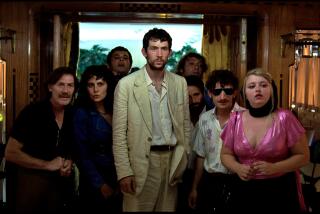1952’s lauded ‘Forbidden Games’ from France remains in a class by itself
- Share via
“Forbidden Games” may be one of the acknowledged classics of post-war French cinema, the winner of both the Golden Lion at Venice and the 1952 Oscar for foreign language film, but it is also a difficult motion picture to put in a box.
Those honors notwithstanding, this Rene Clement-directed endeavor, playing for a week at the Nuart in West Los Angeles in a new restoration from Rialto Pictures, didn’t start a trend or a movement or even point French cinema in a new direction.
Rather, with its mixture of tones, its multiple plot focuses and its singular use of the virtuosity of Spanish guitarist Narciso Yepes on the soundtrack, it is very much its own film. More than that, it is a film whose narrative seems to play differently depending on the time frame in which it’s viewed.
SIGN UP for the free Indie Focus movies newsletter >>
In the early ‘50s, the focus of attention for “Games,” set in the war-torn France of 1940, was its treatment of the two children who play the self-involved games of its title. As the jury at Venice said in awarding the Golden Lion, the prize was “for elevating the innocence of childhood with lyric poetry and expressive force.”
Adapted by Jean Aurenche, Pierre Bost and Clement from a novel by Francois Boyer, “Forbidden Games” begins on a bridge in rural France as Parisians fleeing a ground attack are strafed by pitiless German bombers. Before she can quite take in what has happened, 5-year-old Paulette finds herself an orphan.
As played by Brigitte Fossey (who went on to an adult career in films like Bertrand Blier’s “Going Places” and Giuseppe Tornatore’s “Cinema Paradiso”), Paulette is a bit of an otherworldly presence, something that the use of Yepes’ intoxicating guitar work in some of her scenes underlines.
Paulette stumbles on a French farm family, the Dolles, who seem only tangentially affected by the war. Eleven-year-old Michel (Georges Poujouly), the youngest of the Dolle children, takes an immediate and protective liking to Paulette, and his determination to do whatever it takes to make her happy is one of the plot’s driving forces.
“Forbidden Games” is especially good at creating the complicity between children, and the film’s original strength, its depiction of the strange and disturbing lengths Michel and Paulette go to in their attempt to understand and come to terms with the world of death they discover all around them, still has an impact.
But seen today, “Forbidden Games” also fascinates in its affectionate yet pitiless black comic portrait of the Dolle family and its bitter internecine battle with the family that lives just next door, the Gouards. No slight is too small, no grudge too unimportant to be passed over and forgotten between these families.
Seen at this remove, more than 60 years after its initial release, “Forbidden Games” can also be seen as being balanced between French cinema’s past and its future.
Connected to the old-fashioned “cinema of quality” films by things like opening credits presented by a hand turning the pages of a book, “Games’ ” deeply personal look at its two protagonists also prefigured the New Wave that was to come. It was just a matter of time.
Twitter: @KennethTuran
------------
‘Forbidden Games’
MPAA rating: None.
Running time: 1 hour, 26 minutes
Playing at: Nuart, West Los Angeles
More to Read
Only good movies
Get the Indie Focus newsletter, Mark Olsen's weekly guide to the world of cinema.
You may occasionally receive promotional content from the Los Angeles Times.









